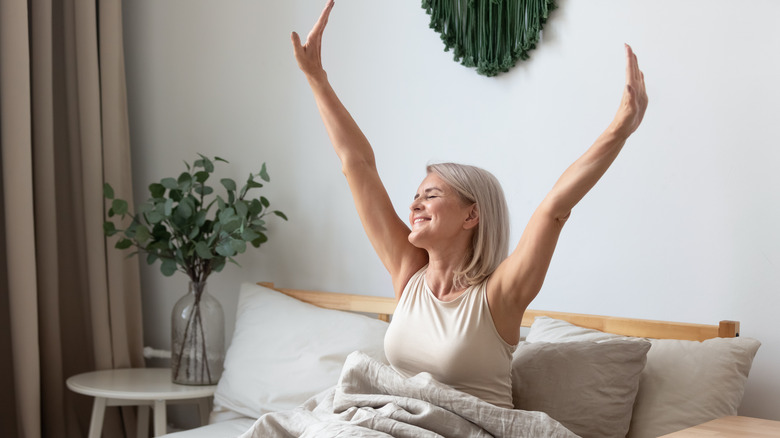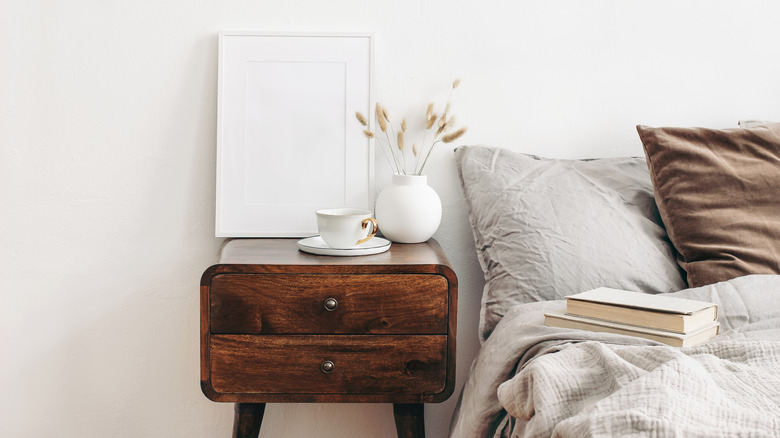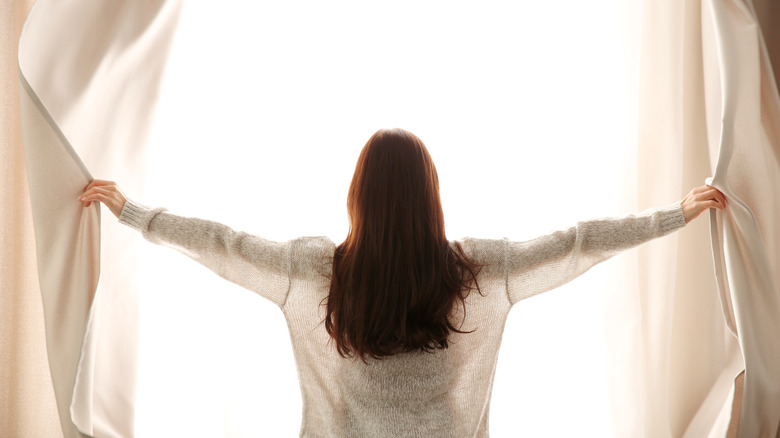Foolproof Ways To Make Your Bedroom More Relaxing
In 2018, The Washington Times reported that around one quarter of Americans spend all day indoors. "In an age when nearly everything can be found (and delivered) online — including food, entertainment and relationships — it's hardly surprising to discover an 'indoor generation,'" the newspaper wrote. Little did they know, in less than two short years, this fraction was about to become a whole lot bigger.
When the COVID-19 pandemic began making its rounds across the globe, authorities stepped in to implement a variety of strict guidelines. The gist of each one was to stay home as much as humanly possible. In the blink of an eye, we traded out slacks for sweats and happy hour meet-ups for banana bread baking parties and jugs of margaritas to-go.
When in-person work or education, social events, and other outings were nixed from the calendar, our homes suddenly became the place from which we had to accomplish our every task. But the time has come to toss out the takeout containers littering your bedroom floor, finally fold that pile of worn and re-worn athleisure outfits, and turn your bedroom back into the relaxing oasis it once was. Here's how.
Separate and simplify your bedroom space for maximum relaxation
In this day and age, work and life have become increasingly less like two different things to balance and more like synonyms. For many of us — especially those with roommates — our bedrooms have been moonlighting as home offices, living rooms, gyms, you name it. But as House Beautiful noted, it's important to signal the transition from one mode to the other. They suggest installing a floating shelf to operate as a tiny desk, actually getting out of bed when it's time to clock in, and ditching your devices when it's finally time to clock out. According to the Sleep Foundation, the blue light that's emitted from electronics inhibits the two stages of your sleep cycle that are most vital for cognitive functioning. Moreover, scrolling through newsfeeds filled with negative news only increases your stress.
Instead of devices, stock your nightstand with things like an eye mask, lip balm, noise machine, framed photograph of loved ones, and/or stack of books you've been meaning to cross of your list for like, let's be honest, years. Go full on Marie Kondo and spend time decluttering your space, keeping only what sparks joy and promotes relaxation. The differences will be huge.
Creating a cozy and calming aesthetic in your bedroom will help you relax
The next step towards creating a relaxation-inducing space is to pay attention to the five senses. If you can get your hands on fresh flowers, keep a bouquet or stem or two in a vase atop your bedside table. If not, an essential oil diffuser or calming candle will do the trick. And while we're on the topic of scents, pillow sprays infused with calming aromatherapy ingredients like rose, lavender, and chamomile will shoot you straight to dreamland, per Health.
Another product to add to your online shopping cart pronto is light-blocking (or better yet, blackout) curtains. Alternatively, you can get creative by covering your windows with any extra blankets or scarves you have handy. According to Tomorrow Magazine, blocking out light allows your pineal gland to optimally produce melatonin and helps ease your transition from day to night. It also helps with temperature and noise control, as well as ambiance.
Speaking of ambiance, a small but mighty thing you can do to turn your room into a relaxation hub is to swap out your lightbulbs. Jenn Feldman, an Los Angeles-base interior designer, told House Beautiful that installing LED soft white lights are a must, as they provide a gentle glow. She also encouraged the use of lamps.
"Overhead lighting is great for tasks or when you're looking for something, but, otherwise, ambient lighting is better," she said. Last but not least, make your bed. It sucks, we know, but you'll feel better for it.


